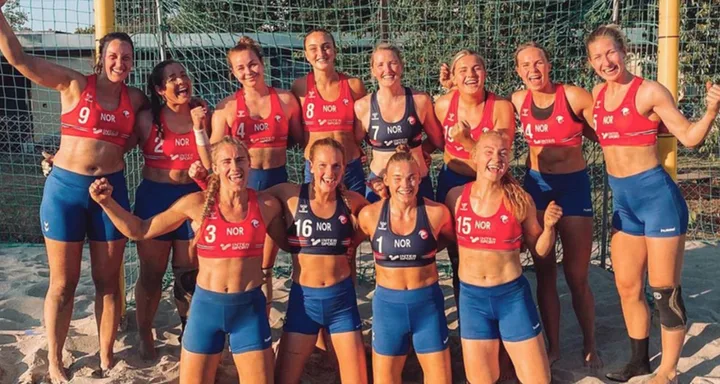After what feels like months of not-so-ideal news, there seems to be a silver lining to the tail end of 2021. Thanks to public outcry, it turns out that The International Handball Federation have removed its sexist uniform rule, after being criticised for its double standards.
Back in July, the European Handball Federation were called out by fellow athletes—and essentially, every other person on the planet—for choosing to fine the Norwegian women’s handball team for their choice to wear small shorts instead of bikini bottoms.
As a result, the team were issued a fine of €1,500 (approximately AUS $2,407) due to their choice of uniform, with the Federation claiming that their shorts were “improper clothing” and that they are required to wear a pair of bikini bottoms that feature “a close fit and cut on an upward angle toward the top of the leg”.
Naturally, once news of their penalty was made public, the world was not pleased with the ruling and demanded that their fine be reversed. In fact, musician and pop culture icon, P!nk, even took to Twitter to share support for the Norwegian team, adding that she wanted to pay their fine in protest of the sexist decision.
And now, despite the ruling taking place around three months ago, it seems as if the International Handball Federation have chosen to quietly (and sneakily) drop the sexist rule, with a new regulation stating that “female athletes must wear short tight pants with a close fit”.
While, yes, their rule change is a step in a positive direction, the fight is far from over, given the extent of sexism that still remains in the rule books of every major sporting event, whether that be a uniform stipulation or not allowing women to play at all.
When it comes to male handball players, the men’s teams are allowed to wear regular shorts, with their only uniform rule stipulating that the shorts must sit 10cm above the knee. In the contrary, women are not only prohibited from wearing the same shorts, but it is specified that their uniforms must be “tight”. At first, one may think that said rule is to aid in the movement of the athlete, but when the rule is non-existent for their male counterparts, it leaves one wondering where the equality lies.
To add more salt to the wound, despite this circumstance requesting that female handball teams must wear uniforms that promote revealing cuts and body exposure, Paralympian Olivia Breen was told the opposite. In fact, earlier this year, Breen was accused by rule makers that the briefs she wore to compete in were “too short and inappropriate”.
But not all is lost. In a positive turn of events, earlier this year, Germany’s women’s gymnastic team chose the 2021 Tokyo Olympics to take a stand against archaic rules on female uniforms.
Taking to the gymnastics arena in full-length unitards, the female athletes—Sarah Voss, Elisabeth Seitz, Kim Bui and Pauline Schäfer—chose to prove how the sexualisation of their bodies in the sport still runs rampant, putting an emphasis on their choice for comfort. During their preliminary round of competition, taking place on July 25, the group opted for long-legged and full sleeved uniforms to make their point.
Traditionally, the women’s teams wear bikini-cut leotards, but the German team’s choice to wear a full-bodied suit that’s typically worn by the men’s teams was about “what feels comfortable,” Seitz told CNN.
“We wanted to show that every woman, everybody, should decide what to wear […] That doesn’t mean we don’t want to wear the normal leotard anymore”.
As for future events, the team vowed that they will only choose which style to wear “day by day, based on how we feel and what we want.”
Unfortunately, while steps are being made in the right direction when it comes to eradicating sexist rules—and removing the equally sexist rule makers with outdated criticisms against female athletes—there’s much more work to be done for women and men to be able to play the exact same sport without discrimination, comments and unfair treatment made against them or their bodies.










